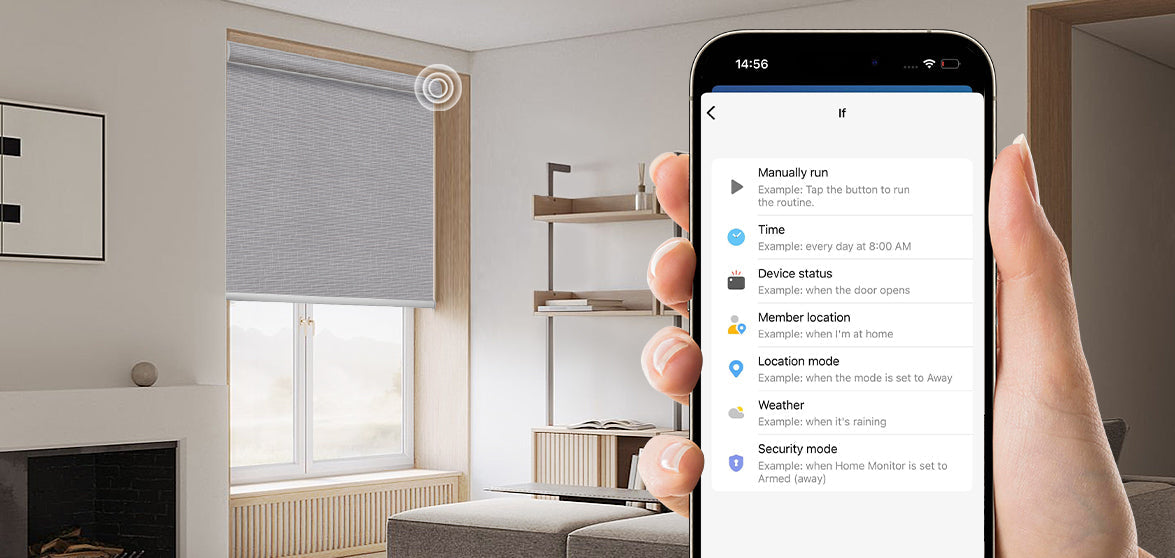
The modern home is increasingly defined by convenience, efficiency, and smart technology. Among the many upgrades available, motorized blinds often spark debate: are they a luxury or a worthwhile investment? If you’ve ever scrolled through product pages, wrestling with jargon and price tags, you’re not alone.
This guide cuts through the confusion, giving you a clear, balanced perspective on whether motorized blinds deserve a place in your home.
Manual vs. Motorized: A Quick Comparison
| Feature | Manual Blinds | Motorized Blinds |
| Control |
Cords, wands, manual adjustments | Remote, app, vioce command, automation |
| Convenience | Requires effort at each window | Effortless, even for hard-to-reach spots |
| Safety | Cords can pose hazards | Cord-free and safer |
| Integration | None | Seamless smart-home compatibility |
| Cost | Lower upfront | Higher initial investment |
| Installation | Often DIY | DIY or professional |
Unveiling the Benefits of Motorized Blinds
Enhanced Convenience and Effortless Control
Motorized blinds save time and simplify routines:
Remote and App Control: Adjust shades from anywhere.
Voice Command Integration: Hands-free operation with Alexa, Google, or Siri.
Scheduled Automation: Set blinds to follow your day—morning light, evening privacy, or seasonal light optimization.
Superior Safety for Families
Dangling cords are a hazard for children and pets. Motorized blinds eliminate this risk, offering peace of mind with a clean, cord-free design.
Energy Efficiency and Climate Control
Windows are a major source of heat gain and loss. Automation helps manage this:
Summer: Close blinds during peak sun to keep rooms cooler.
Winter: Let in sunlight during the day, insulate at night.
UV Protection: Shield furniture and flooring from fading.
Elevated Security and Privacy
Blinds that move on schedule create a “lived-in” look, discouraging intruders. With a single command, you can instantly ensure privacy throughout your home.
Modern Aesthetics and Accessibility
Clutter-Free Look: No cords or wands—just sleek design.
Accessibility: Essential for high or awkward windows, and invaluable for homeowners with mobility challenges.
Understanding the Costs and Considerations
Investment Factors
Unlike manual blinds, costs vary widely with motorized options. Key factors include:
Blind Type & Material: Roller, Roman, wood, or fabric all affect price.
Motor Technology: Quieter motors and premium brands cost more but often last longer.
-
Power Source:
Battery-powered: Affordable and DIY-friendly, but requires recharging.
Solar: Eco-friendly, but reliant on good sunlight.
Hardwired: Continuous power but needs professional installation.
Control System: Simple remotes are cheaper than full smart-home integrations.
Installation: DIY saves money; professional service ensures precision.
Cost Checklist
Type and material of blinds
Motor brand and features
Power source (battery, hardwired)
Control method (remote, app, voice)
Smart home hub (if required)
Professional measurement and installation fees
Long-Term Value
Durability: Quality motors often include multi-year warranties.
Battery Life: Charge once every 4-6 months. It also depends on the frequency of use and the size of the shade. Solar helps reduce upkeep.
Software Updates: Choose brands that support evolving smart home standards like Matter.
Who Benefits Most from Motorized Blinds?
Motorized blinds appeal to nearly everyone, but certain homeowners will find them especially valuable:
Smart Home Enthusiasts: Perfect for integrated automation.
Families with Kids or Pets: Safety-first design with no cords.
Homes with Hard-to-Reach Windows: A practical necessity, not just a luxury.
Eco-Conscious Homeowners: Helps reduce heating and cooling costs.
Mobility-Limited Individuals: Enhances independence and daily comfort.
Design-Lovers: Clean, minimalist look that elevates interiors.
Your Next Step: Finding a Smart, Affordable Solution
Navigating the balance between advanced features and a manageable budget can be the most challenging part of the decision. This is where direct-to-consumer brands like Smartwings are making a significant impact by focusing on affordability and seamless integration.
With a range of styles from sleek roller shades to insulating honeycomb blinds, they empower homeowners to achieve a custom, automated setup without the added expense of professional installation. For many, Smartwings represents an excellent starting point for exploring the full smart blind experience without the premium price tag, proving that high-end convenience can be surprisingly accessible.
FAQs
Are motorized blinds easy to install?
Motorized blinds can be either DIY-friendly or require professional installation, depending on the complexity of the system. Battery-powered options are easier to install, while hardwired systems typically require a professional for proper installation.
Do motorized blinds require regular maintenance?
Motorized blinds are low-maintenance, but they may need occasional cleaning and battery recharging (for battery-powered options). Quality motors typically last for several years, and some brands even offer multi-year warranties.
How long does the battery last in motorized blinds?
Battery-powered motorized blinds generally last several months before requiring a recharge, depending on usage. Solar panels can help reduce the need for frequent recharging, making them more convenient in the long run.
Can I use motorized blinds for different types of windows?
Yes, motorized blinds are available in a variety of styles and materials that can fit most types of windows, including large or hard-to-reach ones, offering a practical solution for every room.
What’s the difference between battery-powered and hardwired motorized blinds?
Battery-powered blinds are more affordable and easier to install but need occasional recharging. Hardwired blinds are more permanent and costlier upfront, but they provide continuous power, reducing the need for maintenance.
Conclusion: Are They Worth It?
Motorized blinds are more than a sleek upgrade—they enhance daily life through convenience, safety, energy savings, and modern design. While they carry a higher upfront cost, the long-term benefits often justify the investment.
Ultimately, the decision comes down to lifestyle and priorities. If you value safety, automation, or design, motorized blinds can be a smart addition that pays off in comfort and peace of mind.




